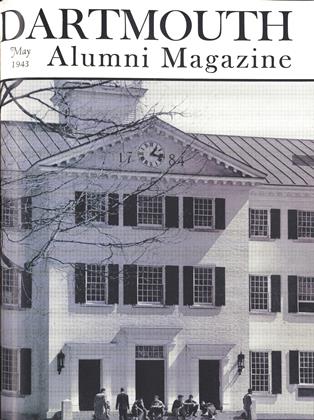by Frank EdgarBailey '26. Harvard University Press, Cambridge, 1942 pp. 312. $3.50.
This timely study should be widely known. Acutely and with no trace of prejudice it clarifies, for the first time, the origins of the AngloTurkish friendship that has been a keystone in the political structure of Europe. Broken in the last war, it is being vigorously renewed as both nations again face a common peril. It began as a bar to Tsarist conquest: its renewal now is ironically against Russia's foe as well as England's; but to the Turks it has always stood as a bulwark against annihilation; and to the English it has meant the preservation of a good customer and the security of the Near East. Without it the story of modern Europe would have been far different, and probably no better.
Mr. Bailey's study, which carries into an earlier period the treatment of the subject in Prof. Sidney Fay's Origins of the World War, begins in the year (1826) when Sultan Mahmoud II attempted to save his disintegrating empire by killing off the Janissaries and starting a premature reform movement (tanzimat). It ends with the outbreak of the Crimean War that frustrated the Tsarist menaces. It threads neatly through the intricacies of hostile interests, of complex trade relations, and of diplomatic tangles. Bringing to light much fresh evidence, the writer makes apparent the highly creditable part played by England for her own security and profit and for the betterment of Turkey. Palmerston and Canning appear as conscientious statesmen, if not always firm and clear-sighted: the Turkish reformers —the Sultans Mahmoud and Medjid and the Grand Vizir Reschid—as crusaders tragically thwarted by a weight of corruption and conservatism. Of Palmerston's wisely cautious policy, Mr. Bailey makes this penetrating comment: "While the sponsoring of internal reform in Turkey showed little outward results, it was the invisible item which made the Foreign Secretary's diplomacy successful and eventually freed Turkey from the Tsar's control."
As one who has lived and worked in that too little regarded land of the East, I gladly bear witness to the soundness and wisdom of England's pragmatic policy of helping the Turks to help themselves. I also heartily recommend this book to anyone who wishes in the light of careful scholarship to diagnose the case of "the sick man of Europe." It gives alt possible information about trade, diplomacy, and internal politics of the period. It should make clear to dreamers of tomorrow that the only basis for a lasting peace is mutual profit and security, to which each nation contributes in the spirit of friendly helpfulness.
 View Full Issue
View Full Issue
More From This Issue
-
 Lettter from the Editor
Lettter from the Editor'Round the Girdled Earth
May 1943 -
 Article
ArticleTHE LIBERAL ARTS COLLEGE
May 1943 By W. H. COWLEY '24 -
 Article
ArticleBrief Biographies of Buildings
May 1943 By LEON BURR RICHARDSON '00 -
 Article
ArticleFrom the Mailbag
May 1943 -
 Class Notes
Class Notes1937
May 1943 By JOHN H. DEVLIN JR., FREDERICK K. CASTLE -
 Class Notes
Class Notes1918
May 1943 By ERNEST H. EARLEY, RICHARD A. HOLTON
E. B. Watson '02
Books
-
 Books
BooksFaculty Publications
January 1924 -
 Books
BooksJUDAISM DESPITE CHRISTIANITY. THE "LETTERS ON CHRISTIANITY AND JUDAISM" BETWEEN EUGEN ROSENSTOCK-HUESSY AND FRANZ ROSENZWEIG.
FEBRUARY 1970 By EDWARD MARTIN POTOKER '53 -
 Books
BooksThe Biology of Death
June, 1923 By H. G. Coar -
 Books
BooksLew Stilwell: A Fine Teacher
JUNE 1963 By JAMES L. MONTAGUE '28 -
 Books
BooksEARLY AMERICAN ARCHITECTURE
May 1952 By Mark L. Peisch '44 -
 Books
BooksTHE NOBEL PRIZE TREASURY
July 1948 By Vernon Hall Jr.



